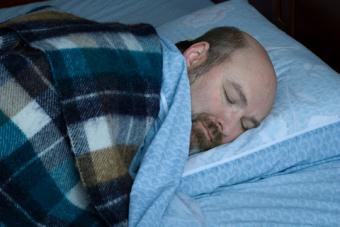
If you struggle with falling and staying asleep, try these seven techniques to improve sleep. The techniques are not suitable for everyone, and they should not replace proper medical treatment for sleep disorders.
Seven Techniques to Improve Sleep
You can augment treatments for sleep disorders or sleep problems with simple techniques to improve sleep. Consider the following seven ways to get a better night's sleep as complementary approaches.
1. EFT for Insomnia
The emotional freedom technique (EFT) for insomnia is a method to promote better sleep that uses tapping techniques that are believed to alleviate stress and unblock energy. The approach is ideal for people who do not want to buy a product or take sleeping pills. It can be effective as a form of relaxation that can help you prepare for sleep.
2. Cognitive Behavioral Therapy
Cognitive behavioral therapy can be effective in treating sleep problems. The approach takes commitment and it includes different options to practice including sleep restriction, cognition exercises and stimulus control. Cognitive behavioral therapy is appealing to people who want to avoid taking medication and who recognize the effects thoughts have on emotions and physical states.
3. Hypnosis
A hypnotic state differs from sleep but it can improve sleep by helping you shift gears. Hypnosis can help you transition from active to calm brain activity. Options include self hypnosis recordings which promote sleep. The approach moves focus away everyday stressors and on to relaxation.
4. Delta Sleep System
Like hypnosis, the Delta Sleep System changes brain wave activity to improve sleep. The recording is designed to stimulate delta brain waves, which are most commonly found in the deepest stages of sleep.
5. Sound Machines
Sleep sound machines block out distracting or startling sounds, replacing them with white noise or relaxing sounds. Sounds include water, heartbeat and nature. A white noise generator is an alternative to sound machines.
6. Holistic Sleep Medicine
Holistic sleep medicine addresses sleep problems with natural supplements which are effective in improving sleep. Popular choices include valerian root, chamomile and passionflower. It is important to discuss this approach with your doctor before taking any supplements, especially if you are taking medication.
7. Foods and Vitamins
Certain foods naturally make you sleepy, and eating these sleep inducing foods shortly before bedtime can improve sleep. Foods containing tryptophan can be effective, but eating too much right before bed can be counterproductive.
Certain vitamin deficiencies can lead to sleep problems. Eating foods that contain the vitamins D, B and magnesium or taking vitamin supplements may help.
Treating Sleep Problems
Sleep problems include conditions, called dyssomnias, that interrupt the timing, duration or ability to fall sleep. Treating dyssomnia begins with an evaluation to determine the cause of the disturbances. Treating underlying medical conditions, sleep apnea or other physical problems can lead to improved sleep.
Dyssomnia may stem from poor sleep habits and irregular schedules, and these conditions should be considered as you look for ways to sleep better. Alcohol, stimulants and some medications can be the source of the problem. Addressing these problems may automatically help you sleep well.
Tips for Improving Sleep
LoveToKnow Sleep Disorders has many quick tips for improving sleep which can offer viable solutions to your sleep woes. Read Ten Easy Tips for a Better Night's Sleep and Comparison of the Best Sleep Systems for more strategies to improve sleep.







